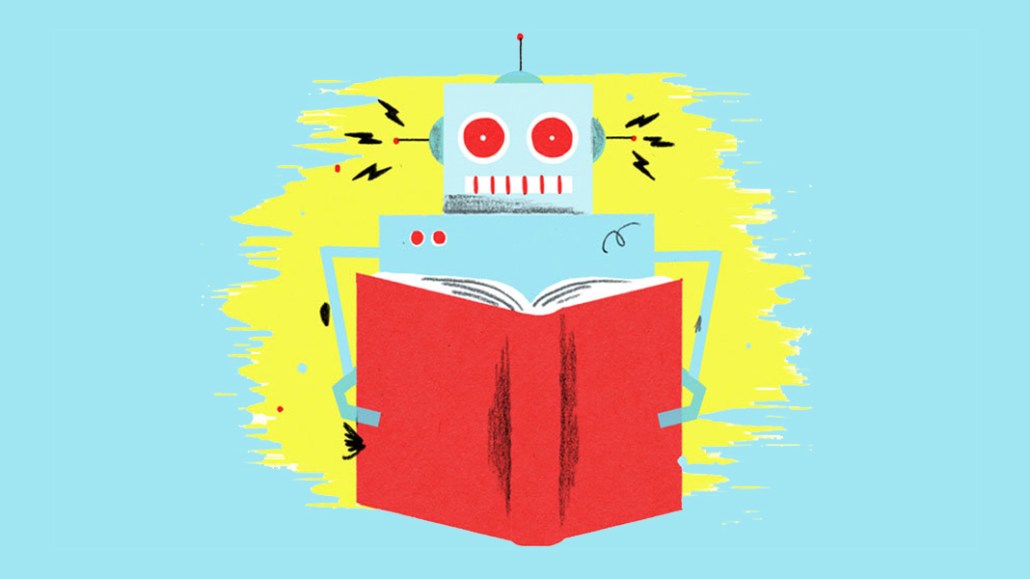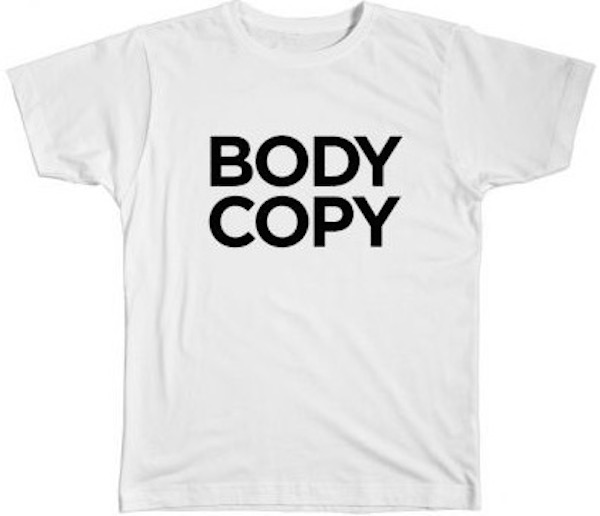Secure your place at the Digiday Media Buying Summit in Nashville, March 2-4

Mark Duffy has written the Copyranter blog for 11 years and is a freelancing copywriter with 25-plus years of experience. His hockey wrist shot is better than yours.
The perfect machine-learning AI copywriter is coming. Very soon.
Analog copywriters, you think I’m kidding? Then you should probably stop reading right here.
Goldman Sachs is already throwing sacks of money behind one of them — Persado. (Terrible name, humans. You should ask it to come up with 1,000 better names for itself. Or even better, hire another robot copywriter to do it.)
Here’s copy from its website: “What if there were a way to inspire action every time?” (What if I started a tree farm in Vermont?) More site copy: “Emotional and rational triggers quantified. … (Don’t mention “triggers” right now, please.) “Effective communication systemized. … Hard science behind soft skills.” (SOFT?)
You can bet other tech gurus (Apple, for sure) are working on better versions of Persado. And when you consider the abysmal state of advertising copywriting, robot copywriters can’t get up and online fast enough. Data is being optimized, the Customer Experience is being optimized, and it’s way past time for copywriting to be fully optimized.
All of you writers crying about your “craft” need to step off and face reality. Copywriters aren’t writers. We’re quipsters, pun-anators, phrase-ers, slicksters. Writers get paid to write; copywriters get paid to sell. Period. And no, “content” writers, you’re not real writers, either.
Some copywriters will still have job opportunities in the near-future Artificial Creative Departments. The politically and morally supple of you will survive. You’ll just have new titles, like Robot Copywriter Monitor, Robo-Curator or Account Executive.
The robots will have some weaknesses. They won’t wear “cool” frames or “cool” kicks. And they won’t hover over your shoulders, art directors, giving you that last amazing little layout change that really “brings everything together.”
Their strengths, though …
– You need two weeks to create a great campaign for a pitch? Robots will mold and hone 10 different campaigns tied to 10 different strategies while you’re taking a work dump. You wrote two versions of body copy for a launch ad? Robots will write a hundred versions of the same copy, and the only reason it would stop there is because it was told to.
– You wrote a Gold Lion-winning TV spot? The robot will feed from your ad and 100 other ads for that brand and spit out a Titanium Lion-winning follow-up spot, and it won’t then demand to be sent to Cannes fully comped every year thereafter like a complete douchebag.
– No groaner pun headlines (unless you ask for them).
– Robot copywriters won’t suck at grammar like you (and me).
– A robot will search the entire internet to find the exact right cause/issue/purpose to seamlessly attach to a brand, making the brand look damn near altruistic.
– “Immersive Storytelling” will sound so much better via the AI CW’s soothing voice.
– You can name your robot copywriter whatever you want: Bernbach, McCabe, Draper, Steinbeck, copyranter, Steadman (look him up, kids).
– Robots will pull all-nighters every night and not smell like ass in the morning.

The technological race for human (consumer) attention won’t be won by human copywriters. This “People Based Marketing” everybody’s crowing about will very soon be executed best by nonhuman copywriters. Every day, brands and marketers are demanding more and more speed and more and more ideas from their “creative” agencies. And creative agencies are gape-mouthed clueless on how to meet these demands. There is much money to be made closing this gap. And you can bet ethicless Silicon Valley will close it. Quick.
But you got a half-finished novel in your “personal” folder, don’t ya, flesh copywriter?
More in Marketing

Future of Marketing Briefing: AI’s branding problem is why marketers keep it off the label
The reputational downside is clearer than the branding upside, which makes discretion the safer strategy.

While holdcos build ‘death stars of content,’ indie creative agencies take alternative routes
Indie agencies and the holding company sector were once bound together. The Super Bowl and WPP’s latest remodeling plans show they’re heading in different directions.

How Boll & Branch leverages AI for operational and creative tasks
Boll & Branch first and foremost uses AI to manage workflows across teams.





